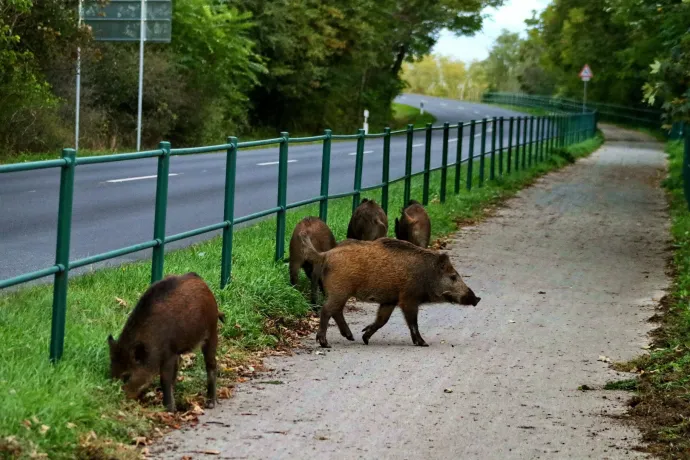
They tend to cause accidents, their regulation is in a gray zone and is completely useless. Making it effective would require a lot of work, effort or time or a combination of these – there is no easy solution for anyone looking for a reassuring and effective solution to urban wild boars. In Balatonfűzfő the situation has reached a breaking point.
At night, the wild boars practically impose a curfew (...) The gateway to the World Hunting Expo, which was built from deer antlers, would have looked good with a couple of wild boar hides or tusks. It would be more realistic for today's Hungarian reality
– wrote one of our readers from Balatonfűzfő, one of the towns on the shores of Lake Balaton which has been fighting wild boars that tend to visit populated areas. The wild boars rule over Balatonfűzfő from dusk till dawn, but they don't necessarily stick to the darkness anymore, they started showing up during the day as well. Destroying gardens, upsetting and trashing rubbish bins, ten or twenty of them marching together at once, their presence frightens many residents and the lack of a solution to the situation angers many.
The municipality has been looking for a solution for some time. Most recently, a decision was taken to purchase a live wild boar trap costing nearly 400,000 forints, but it has not lived up to expectations. Later on the municipal management committee met to discuss the wild boar issue again with the police chief and the heads of the two local hunting associations.
They tried but it just got worse
"They have terribly proliferated", said the chairman of the committee, setting the tone for the meeting as he went on to explain that he had personally had an encounter with a wild boar in a park near the municipality, with the animal only five metres away. Although the problem has been present for several years, it has been growing steadily over the last two years, and he believes that the number of animals in the residential area of the town is now in the hundreds.
People are trying to get out of their way. Although the municipality is not aware of any attacks on residents, the chairman of the committee said that "it is in the air" that such an attack could happen at any time and that there is a huge responsibility and pressure on the council.
The mayor, Szilvia Szanyi, listed the efforts made so far: they have introduced compulsory rubbish bins to stop holidaymakers putting their rubbish in nylon bags to attract wild boars, they have started to clear untidy bushy areas, they have organised on-site visits with hunting associations and the police, they have collected data on how others elsewhere are dealing with the issue, and they have set a live trap, which failed to work. But while they were doing all this, the situation was getting worse, not better, she added.
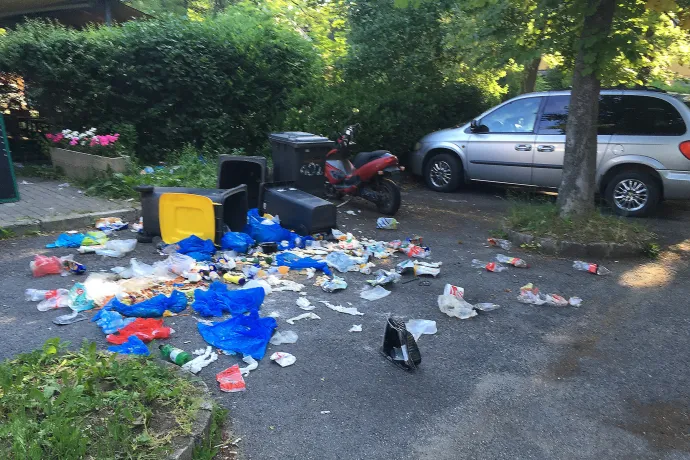
The police respond when called, but there's not much they can do
"We don't hold the key to the solution," police chief Zoltán Borbély told the committee. The police also receive regular reports of wild boars from all over the area, but they do not have the means to deal with the situation. If they receive a report, they go to the scene and try to calm the person who called them, otherwise, they remain bystanders in this situation, as they cannot do anything else. They can notify the hunting company, but the hunter cannot just shoot the animal unless human life is in imminent danger.
In Hungary, the police have a role in dealing with the wild boar problem in that they can give permission for so-called "residential area shooting", i.e. shooting in a residential area under strictly regulated, pre-defined conditions. But no permit has been issued for Balatonfűzfő.
One of the hunting companies was not given permission for the places where it would have been a good idea to try, and the other company, after a site visit, concluded, according to the police chief, that there were no hunters willing to use hunting weapons in the inhabited area.
No one would dare, both because of their conscience and the implications of criminal law, to fire their rifle in this residential area – they were told at the meeting.
As to why this was considered risky, the police chief recalled the shocking hunting accident in Újfehértó, when a shot accidentally killed a man two kilometres away.
It is a smart animal and it likes to feel comfortable
The police chief said that he knew that in Csopak, for example, the situation had been sorted out quite well after the municipality had cleaned up the untidy gardens and closed down what could be. At a meeting of the committee in Fűzfő, the heads of the hunting associations also tried to push the search for a solution in this direction. If wild boars don't feel comfortable in the cleared, open area, they will go back to the forest, they said.
The residents who are forced to constantly avoid wild boars see the fault in game management, but according to what was said at the meeting there were already "huge numbers" of wild pigs shot in the area last year (more than 400 by the two hunting companies combined), and that, as one hunting company manager said
"the more we shoot the boars, the more they feel harassed and come into the populated area. It's a smart animal." "We hardly see any wild boar out in the field anymore," noted another hunting representative.
And the problem with driving the animals out, according to the hunters, is that they go back in the evening – even in populated areas where it is an accident hazard. The mayor suggested that they could try using tranquiliser darts in the residential areas, but – apart from the need to obtain special permits and to have a vet – there is also the risk of accidents, according to the hunters: if the bullet does not work on the wild boar, who will the angry animal attack?
Various types of alarms were also discussed at the meeting, but hunters were not very encouraging about them either: one type has such an unpleasant smell that it cannot be used in residential areas because it is impossible to bear, and the ultrasonic game alarm is also disturbing to pets.
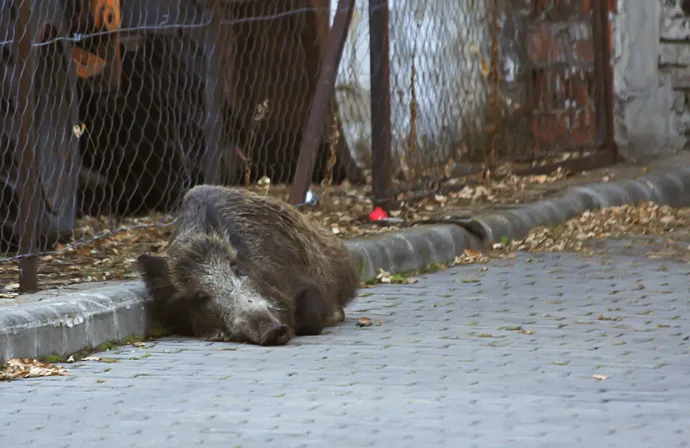
Running and shouting is not a good idea
The situation is particularly bad in Balatonfűzfő-Gyártelep and this area cannot be fenced off. So what should the residents of the neighbourhood do if they come across a wild boar? – someone asked at the meeting. The answer is that the main thing is to do nothing that would make the wild boar feel threatened. If you have walked, simply keep walking, don't run, don't shout, "even the most robust wild boar will just walk away until it feels in danger".
Finally, the meeting in Fűzfő was concluded with the fact that the office will examine the ineffectiveness of the existing trap and a proposal will be made, and the municipality will also start a survey of untidy areas, ask owners to clean up the mess and replace the rubbish bins.
The fact that the urban wild boar problem is more serious than ever – and not only at Lake Balaton – is true, but it is also true that there are fewer wild boars in the country than a few years ago.
African swine fever took its toll on wild boars. While the reported number of wild boars in Hungary ranged from 100,000 to 110,000 between 2010 and 2018, the number has fallen to around 83,000 in two years, according to the National Wildlife Data Registry. This is the result of both the disease and the fact that more animals than usual were shot. The African swine fever affected the northern and northeastern counties the most, these being the areas where the most wild boars were lost. (However, the publication of the Registry on the 2019/2020 hunting year still calls a radical reduction in the number of wild boars an "unavoidable task".)
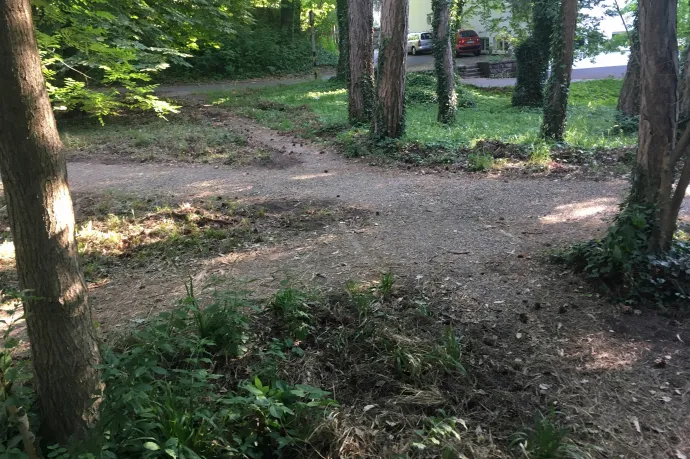
Trophy wild boar by the four-storey residential building
While Balatonfűzfő has rejected shooting the boars in residential areas, there are towns all over the country where they are giving it a try. In Miskolc, for example, Minap reported in September 2020 that hunters shot 80 wild boars in the city's residential areas since March of that year. "One of them was a trophy boar with a 19-centimetre-long tusk, which was shot at the foot of the four-storey apartment buildings in the Mendikás-dűlő, a neighbourhood frequented by people," the paper wrote.
And then there is Pécs, where according to Bama a permit was issued to hunt in a residential area at night on two specified properties from the end of March until the end of December last year. And in Nagykovácsi, a 3-month period was appointed during which a local street warden with a gun permit was allowed to shoot wild boars.
The official issued permit for Nagykovácsi is a good example of how meticulously hunting in residential areas is regulated: It specifically lists the streets where shooting is allowed, and stipulates that the fact of entering the scene must be recorded in the hunting logbook which is found at the reception desk of the municipal office, also, the shooting, including any accidental ricochets, must be carried out in such a way as to avoid personal injury or damage to property, and the police station issuing the permit and the body authorized to hunt must be notified in writing three days in advance about the actual time and place of the hunt.
Gray zone
In fact, hunting in residential areas is a kind of "gray zone " because of the specificity of the regulations, Attila Földvári, chief officer of the Hungarian National Hunting Association told Telex. And, there are several problems.
For one, the hunting law is not in line with the government's regulation on the use of weapons. According to the law, which has the strongest legal force, residential inner areas are not part of the hunting area, which means that the hunter cannot use his weapon there, and cannot even carry out any hunting activities, including trapping, and there is no mention in the law about what to do with the stray game in town.
However, the government decree already deals with this issue, stating that it is possible to shoot a huntable animal that causes damage in a residential area with the permission of the police responsible for the area, and also lists what the application must contain. One of the content requirements is the exact place and time of the killing.
In other words, in principle, it should say in advance that the wild boar will be killed, say, at Petőfi and Kossuth streets, at 3 p.m. The only problem is that "the wild boar is not informed about this", said the official of the national hunting association, referring to the unrealistic situation.
In practice, police stations issue permits for periods, time slots and times of day, and no one bothers. But many people still find the regulatory situation confusing. The need for a change has already been raised with the Ministry of Agriculture by the National Hunting Association, which represents the interests of organisations with hunting rights.
Telex has also contacted the Ministry of the Interior and the Ministry of Agriculture on the wild boar issue. We asked whether there were any plans or preparations for changes in legislation or new legislation (for example, on the hunting of wild game in residential areas) and, if so, what the plans were and what changes could be expected. The Ministry of the Interior has indicated that the other ministry is responsible, and our questions have been forwarded to them.
In its reply, the Ministry of Agriculture, referring to the existing regulations in force (the aforementioned government decree and the implementing decree of the Hunting Act), stated that "it is now permissible to remove wild boars that appear in the interior and cause potential damage, and to resolve the situation in this way".
The latter decree allows, by special authorisation, the use of stunning and paralysing chemicals, ammunition or "trapping methods lawful for the capture of the game", without endangering the life and limb of the game, if the aim is to remove it from inhabited areas.
They added that there is an ongoing professional dialogue with all stakeholders on the situation and solutions to the problem of huntable game species that appear and settle in residential areas and are thus disturbing the daily life of the population.
Should there be a specialized service?
According to Attila Földvári, the solution to the wild boar problem should not be found in killing them in residential areas: it is a symptomatic treatment and not very effective. The wild boar does not always turn up when the hunter is waiting for it with a permit, it takes a lot of time, and no one can be obliged to do it.
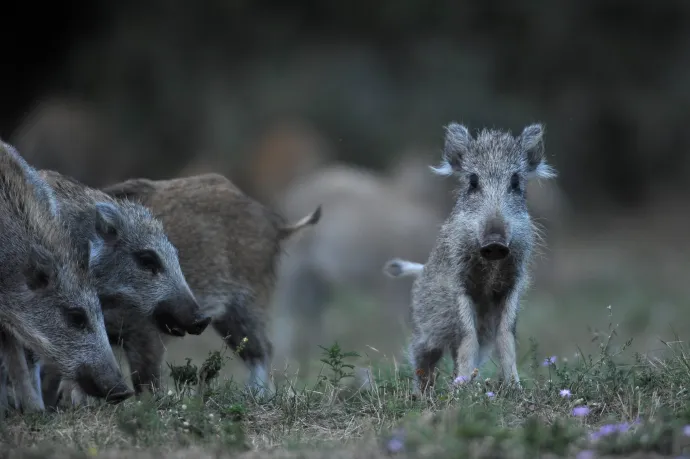
Nor does it seem a viable option to trap the boars and take them to the forest. In an experiment in Poland, where a GPS tag was placed on the animal, the boar returned to the place from which it had been taken in a day and a half, even from a distance of tens of kilometres.
Now there is no one really in charge of the area. One idea that has come up is to set up a specialised service, modelled on the American model, where trained professionals would deal with the problem, go to the scene, catch the animal, trap it or stun it with a tranquilizer bullet, Földvári said.
The funding of a specialist service could be envisaged at the state or even municipal level, but if the animal is a problem on private land, residents could also cover the costs, as it would be their responsibility to protect the land properly.
The training of professionals is already in place. Urban wildlife management has been taught for years as a separate subject at the Department of Wildlife Biology and Management of the Institute of Wildlife Management and Nature Conservation of the Hungarian University of Agricultural and Life Sciences in Gödöllő (and formerly at the Institute of Wildlife Conservation of the predecessor Szent István University).
And why should urban wildlife be specifically addressed?
These wild boars are a bit different
Miklós Heltai, director of the Institute of Wildlife Management and Nature Conservation at the Hungarian University of Agricultural and Life Sciences, recently conducted a study on behalf of Pilisi Parkerdő Zrt (Pilis Park Forest Ltd.). The study of wild boars in the residential areas of Buda showed that they are no longer occasional visitors, but that there are animals which are clearly urban, born and socialised in residential areas.
The research showed that there is a genetic difference between urban and forest wild boars. The difference is in chromosome 18, which is responsible for stress tolerance, sleeping patterns and abnormal behaviour.
As Miklós Heltai told Telex, it is a common phenomenon that adaptable species appear in inhabited areas, and very similar reasons are at play, whether it is a tit or a wild boar. The main reason is that the species in question has a wide range of adaptability and simply finds suitable habitat there: there is suitable shelter, and food, and for smaller species, the fact that they have a favourable urban microclimate also plays a role.
Even green waste is worth being careful with
It seems that recently, some residential areas have simply become better habitats for wild boar than they used to be. According to Heltai, in the past, plots of land in the urban periphery were typically allotments, weekend allotments, which were regularly visited by their owners, who maintained, managed and protected them. Many of these gardens are now neglected, and there are quite a few of them in Buda. And then there are the patches of woodland wedged between houses, where wild boars can also hide very well.
So, with untidy areas, the hiding place is a given, and then there is the smell of fermentation, litter, or even just green waste, under which insects, grubs, and snails – all excellent food for wild boar – can multiply. According to Heltai, if you don't want to find wild boar in your garden, it's very important not to leave any food out for them, but you also have to be careful about dumping green waste.
Neither Attila Földvári nor Miklós Heltai have heard of any incidents in recent years of people being injured by wild boar in the countryside. However, the advice to the people of Fűzfő is still very important: it is best to stay away from wild boars when encountering them.
For more news from and about Hungary delivered straight to your inbox, subscribe to the Telex English newsletter!
The translation of this article was made possible by our cooperation with the Heinrich Böll Foundation.